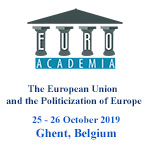Euroacademia Conferences
 Europe Inside-Out: Europe and Europeanness Exposed to Plural Observers (9th Edition) April 24 - 25, 2020
Europe Inside-Out: Europe and Europeanness Exposed to Plural Observers (9th Edition) April 24 - 25, 2020 Identities and Identifications: Politicized Uses of Collective Identities (9th Edition) June 12 - 13, 2020
Identities and Identifications: Politicized Uses of Collective Identities (9th Edition) June 12 - 13, 2020 8th Forum of Critical Studies: Asking Big Questions Again January 24 - 25, 2020
8th Forum of Critical Studies: Asking Big Questions Again January 24 - 25, 2020 Re-Inventing Eastern Europe (7th Edition) December 13 - 14, 2019
Re-Inventing Eastern Europe (7th Edition) December 13 - 14, 2019 The European Union and the Politicization of Europe (8th Edition) October 25 - 26, 2019
The European Union and the Politicization of Europe (8th Edition) October 25 - 26, 2019 Identities and Identifications: Politicized Uses of Collective Identities (8th Edition) June 28 - 29, 2019
Identities and Identifications: Politicized Uses of Collective Identities (8th Edition) June 28 - 29, 2019 The European Union and the Politicization of Europe (7th Edition) January 25 - 26, 2019
The European Union and the Politicization of Europe (7th Edition) January 25 - 26, 2019 7th Forum of Critical Studies: Asking Big Questions Again November 23 - 24, 2018
7th Forum of Critical Studies: Asking Big Questions Again November 23 - 24, 2018 Europe Inside-Out: Europe and Europeanness Exposed to Plural Observers (8th Edition) September 28 - 30, 2018
Europe Inside-Out: Europe and Europeanness Exposed to Plural Observers (8th Edition) September 28 - 30, 2018 Identities and Identifications: Politicized Uses of Collective Identities (7th Edition) June 14 - 15, 2018
Identities and Identifications: Politicized Uses of Collective Identities (7th Edition) June 14 - 15, 2018
Does Liberalism Need a Bit of Despotism?
-
-

-
Presentation speakers
- Matteo Rategni, FINO (Northwestern Italian Philosophy Consortium), Pavia, Italy
- Download presentation
Abstract:
The aim of this paper is to provide an analysis of the relationship between the political and the economic domains, affirming the primate of the former over the latter as viable solution to the present situation in EU. In seeking the notion of political Modernity, from a juridical and historical point of view, the concept of sovereignty might be taken as a crucial criterion. From a political viewpoint, indeed, the passage from a personal to a territorial idea of sovereignty is considered a watershed between Middle Ages and Modernity. The thesis of Carl Schmitt’s The Nomos of the Earth is that Europe achieves a peaceful balance only after the Peace of Westphalia (1648), when European states recognize each other as sovereigns and equals. Nowadays, the traditional notion of sovereignty seems to be overpassed and partially replaced by over-national economic powers, which are far more extended and influencing than the sovereign states. This type of economic, personalistic power has an ill-fated influence on the inhabitants of the global polis. This latter is a kind of power with equal strength as the political one, but without the distinguishing degree of rationality. The order of the political sphere appears to be replaced by the disorder of an uncontrolled economic concurrence, generating in many citizens impotence and other disturbing feelings (nationalism). These powers, over-national and personalistic, appear completely counterposed to the modern idea of politics itself, conceived as a teleological nomos. In this sense, it is possible to speak of a neo-Medieval Europe. Taken as a whole, this condition of nation states and global capitals could be assumed as despotic, but certainly not as enlightened. A genuine enlightened despotism – however thought as a political sovereignty able to discipline the economic power and to guarantee actual freedom to the people on its territory (Europe?) – could be a fascinating political perspective to probe for.
-
Related Presentations

European Social Thinking and the “Other”
- Dolores García

Does Fake News Affect Voting Behaviour?
- Michele Cantarella
- Nicolò Fraccaroli
- Roberto Volpe

Europeans by the Polls. What Voter Motivation Tells Us about EP Accountability
- Dorian Alt
- Erik Brandes
- David Nonhoff













